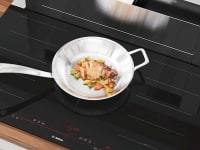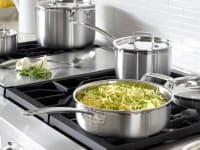No stupid questions—what real people want to know about induction cooking
A quick FAQ about induction.
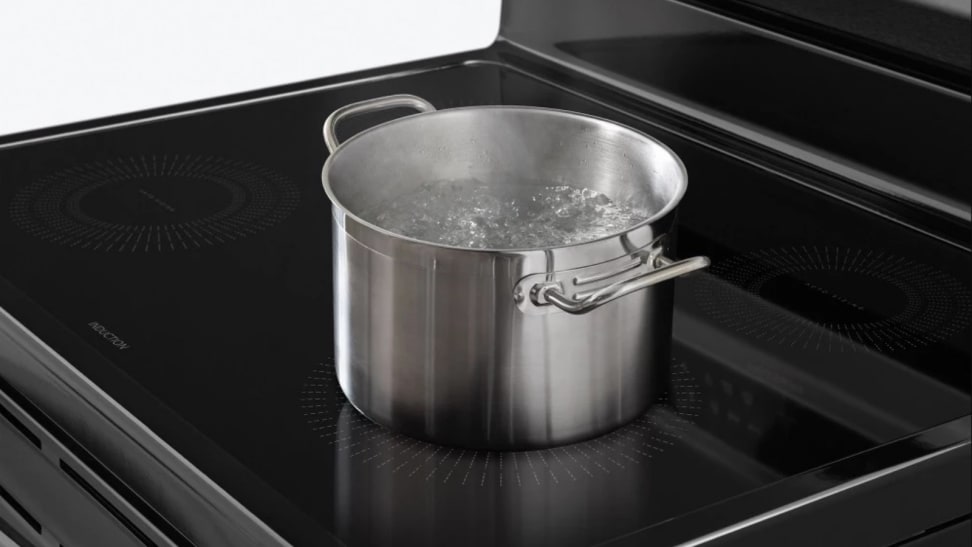 Credit:
Frigidaire
Credit:
Frigidaire
Recommendations are independently chosen by Reviewed's editors. Purchases made through the links below may earn us and our publishing partners a commission. Prices were accurate at the time this article was published but may change over time.
At Reviewed, we’re big fans of induction ranges and cooktops. They provide some of the most precise cooking temperatures, and they're faster, safer, and easier to clean than gas ranges (which is especially good news in the midst of ongoing conversations about banning gas ranges). Induction cooktops work fast and efficiently because...magnets.
Wait, what?!
The fact is that most Americans don't know the first thing about induction cooking. And that's okay.
It turns out that some of our own staff didn't, either. Sure, we have our team of kitchen experts on staff that know that ins and outs of induction cooking, but some of our tech and beauty gurus, for example, still had lingering questions. So we polled the non-experts on staff to find out what questions they were afraid to ask, along with common questions we get from readers.
Here are the actual questions we got.
1. How does induction work?
In short, yes, it really is magnets. We won't go into all the science behind induction cooking here, but basically, an induction cooktop excites the iron atoms in a pan to generate heat. It only heats the pan—not dish towels, your hands, or stray food splatters. Hence, it's a little safer and a lot cleaner.
2. Do I need special cookware to cook with induction?
Yes, but you probably already have what you need. Flat-bottomed pots and pans made of ferrous materials—iron and some steel—are all induction compatible. That includes many stainless steel pots and pans.
If you have any doubt about whether or not one of your pans will work, try sticking a magnet to the bottom. If it sticks well, it has enough iron to use for cooking on your induction cooktop. Cast iron pans are magnetic, but use them carefully because they can scratch a glass cooktop. And when you’re buying new pots and pans, be sure to look for the induction-compatible symbol on the bottom.
3. How long does it take to boil water on an induction cooktop?
Users love the fast boil time. Induction cooktops heat up more quickly than gas or electric burners. Although cooktops vary, you’ll probably find that it takes half the time to bring water to the boiling point. We’ve watched a 48-ounce pot of water boil in under three minutes.
4. How can I tell if an induction cooktop is hot?
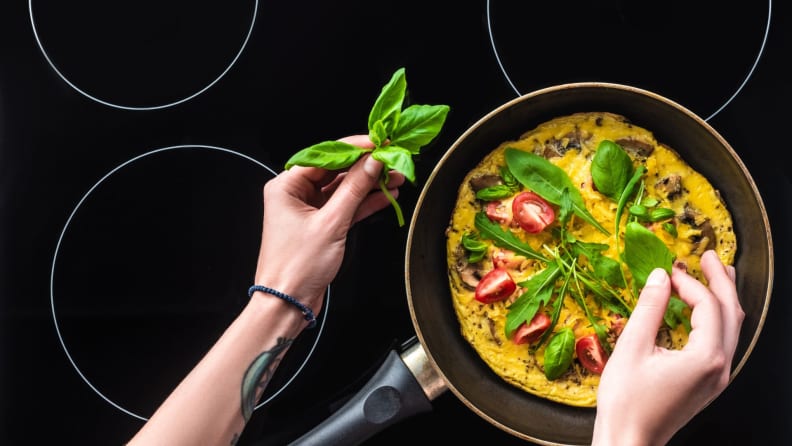
Chefs and home cooks can make beautiful meals on induction cooktop. You can touch the cooktop without getting burned—the only heat is between the pan and the induction element.
It's obvious when a gas flame is lit, and electric coils glow orange, but induction isn't as conspicuous so we understand the concern.
First of all, if you turn on an induction cooktop and forget to put a pan on it, the cooktop surface won’t get hot. The burner will only heat up surfaces made of ferrous metals (see Question #2). Safety win! But all induction cooktops have some visual indication, usually a light on the surface or the control panel, that indicates when a burner is on.
5. Can I accidentally leave an induction cooktop on and burn the house down?
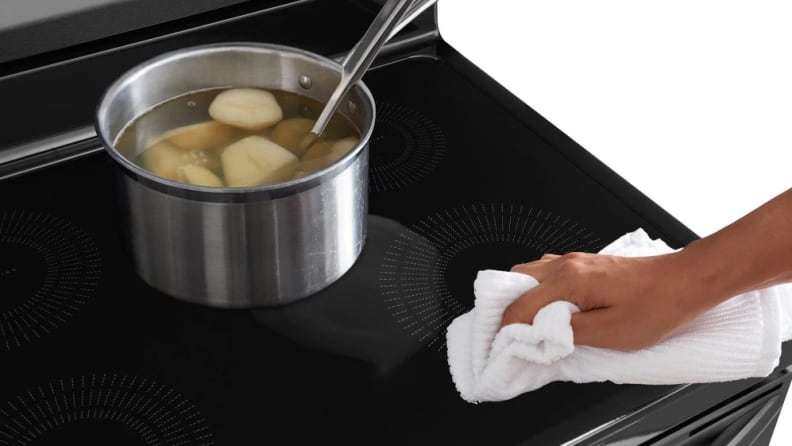
A ferrous pan heats up on an induction cooktop, which creates an electromagnetic field. The dishtowel will not catch fire—it can't ignite on the cooktop, because it isn't metal.
We're not saying that induction is definitively safe, but it seems a lot less prone to some of the obvious hazards of gas and electric.
When it comes to induction, there’s no heat where there’s no metal. If you set a dishtowel or potholder down, it won’t ignite. In fact, it won't even get warm. Could you burn a pot of food on an induction cooktop? Yes! Same as with any other cooktop, you have to keep an eye on the food while it's cooking.
In fact, it is recommended to never put an empty pot or pan on an induction cooktop that is already switched on as that can damage the cookware. Place the pot on the cooktop before switching it on, and then heat the pan gradually.
6. Do I need a special hookup in my kitchen?
It depends. If you’ve had an electric stove there in the past, you already have the 240-volt outlet you need for induction. You'll just need to make sure that the amps are sufficient. A quick look at your breaker box should tell you how many amps you're working with. Most induction ovens are in the 40-50 amp range.
If you’re moving to induction from gas, you need to call an electrician to install a 220-volt outlet. That cost will certainly affect your budget.
7. Is it hard to clean an induction cooktop?
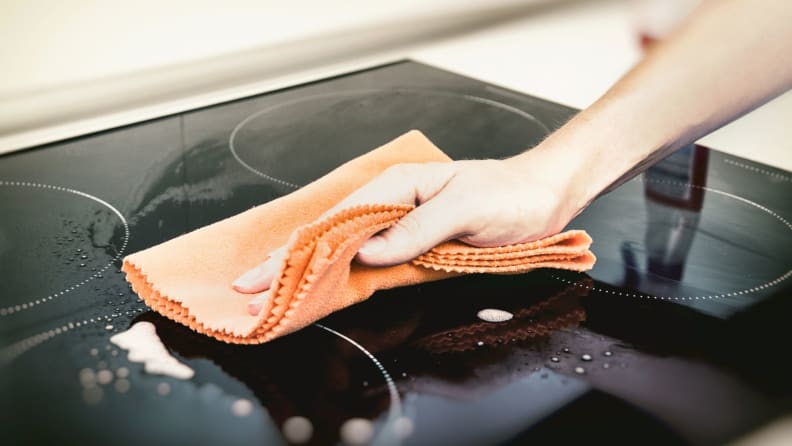
It's easier to clean an induction cooktop than a typical electric smoothtop. Since the heat generated is much less, you're unlikely to encounter burned-on food.
It is no harder to clean an induction cooktop than it is to clean the glass of an electric smoothtop. In fact, it may be easier, because an induction element doesn’t generate enough heat to create baked-on messes.
Here’s all you have to do:
- Turn off the cooktop before you start cleaning.
- Wait until the cooking area cools down completely. Although the cooktop doesn't heat up to cook, pots and pans transfer some of their heat to it.
- Use a small amount of cooktop cleaner.
- Wipe the product around using a paper towel or microfiber cloth.
- Use a clean paper towel or a clean, dry cloth to wipe off the product.
8. How do I turn an induction cooker on or off?
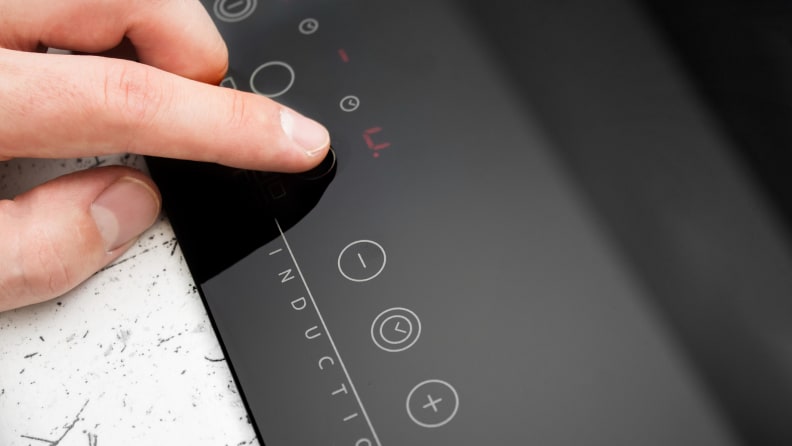
You turn on an element on an induction cooktop by pressing a button or turning a knob. The user manual that came with your cooktop will explain the details.
User interfaces are similar to that of gas and electric ranges. Usually you turn a knob or press a button to activate a burner, but read the user manual for your individual model’s instructions.
9. Can I control an induction cooktop from my phone?
Yes. For example, the Bosch NITP660UC induction cooktop has many smart capabilities. AutoChef can regulate temperatures automatically while cooking, PowerMove allows you to preset multiple temperature levels in a given recipe, and SpeedBoost can make your water boil or oil heat much faster.
This cooktop also connects to the Home Connect app, which means you can monitor your cooking progress through your smartphone and be notified when your meal is ready.
10. What’s the difference between induction and convection?
The words sound similar and are mixed up more often than you might think. In fact, "induction" and "convection" are not related, aside from the fact that they’re both related to cooking.
Induction happens on a cooktop, and convection takes place in an oven or air fryer. Induction cooktops heat iron-based cooking pans using electromagnetism. Convection ovens use heating elements and a fan to circulate air.
11. Is induction cooking more expensive?
Induction cooking is more efficient than gas or traditional electric cooking, so you can save on energy. What's more important—prices are coming down on induction cooktops and ranges, making them affordable to more families. We’ve seen some excellent induction ranges selling for less than $2,000.
12. Can I cook on an induction range if the power goes out?
No. You can’t use an induction cooktop without electricity.
13. Will an induction range increase the value of my home?
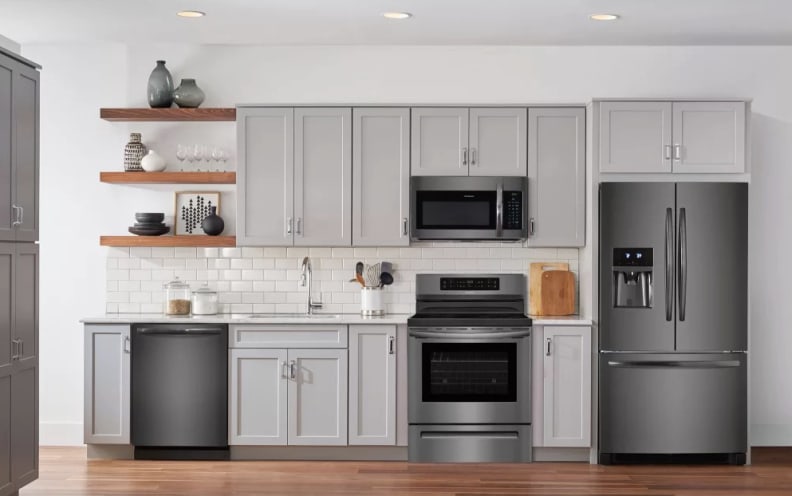
It's hard to know whether installing an induction range in your home will help with resale value, but if you're going to live there for a while, you'll enjoy cooking on it every day.
Maybe. There's no guarantee that it will make your house worth more—you never know which way the real estate market will go. But according to some developers and contractors we spoke to, in some parts of the country an induction range or cooktop is already a plus at re-sale time.
Still have questions? See our entire Induction 101 series and get answers.

